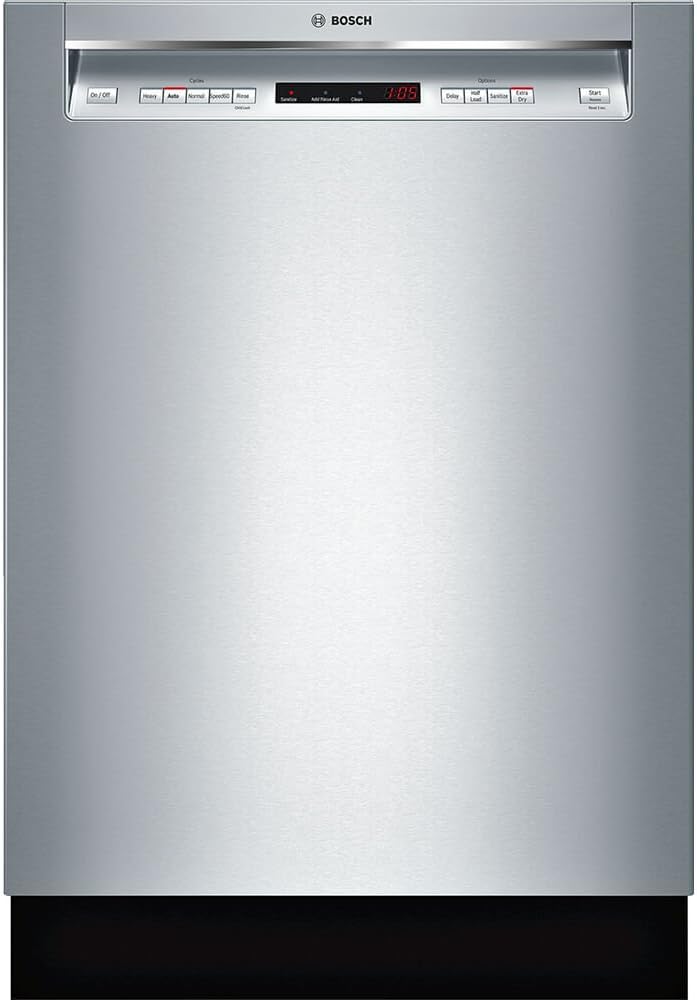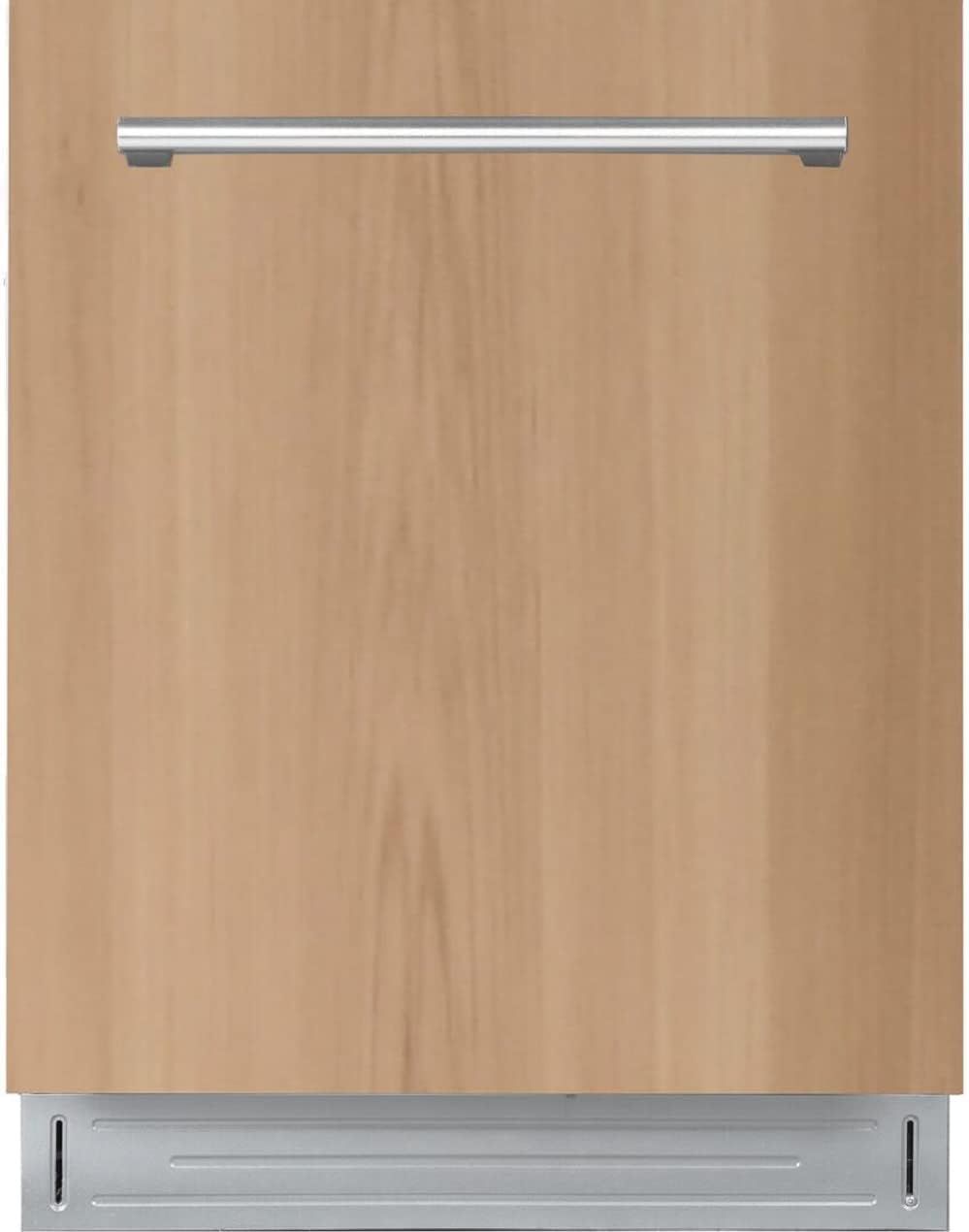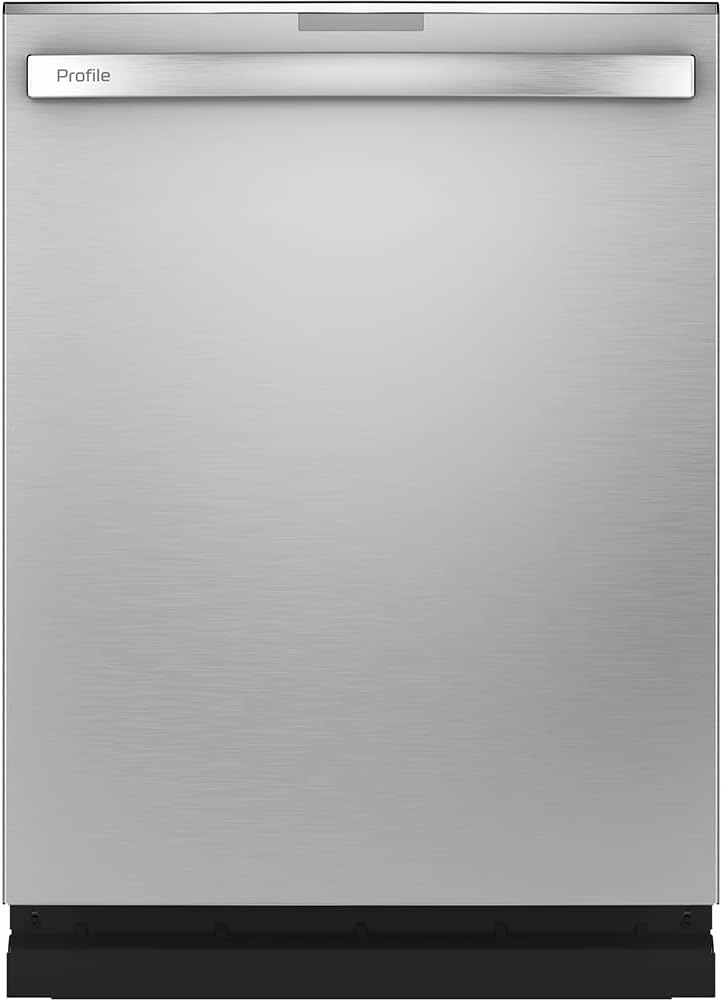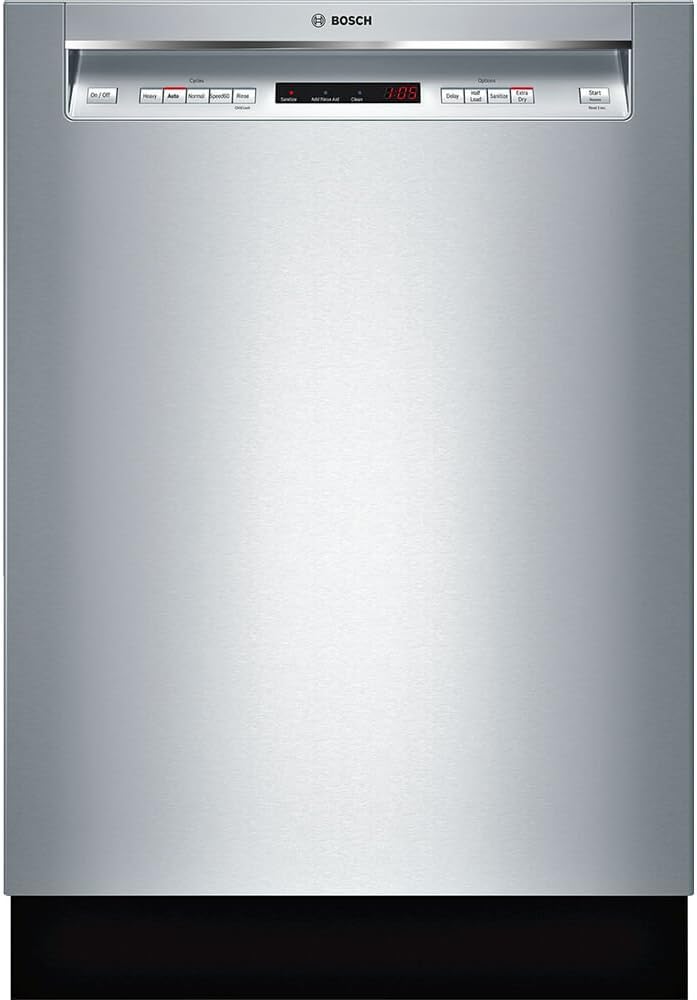Best Dishwasher for Hard Water

Living in areas with hard water can be a real challenge, especially when it comes to maintaining your dishwasher. Hard water contains high levels of minerals like calcium and magnesium, which can leave behind stubborn residue and lime scale on your dishes, glasses, and even inside your dishwasher.
That's why it's crucial to choose a dishwasher that can handle the harsh effects of hard water. Opting for one with a stainless steel tub is an excellent choice as it is more resistant to stains and build-up. Additionally, look for dishwashers that come with built-in water softeners or rinse aid dispensers, as they can help combat the negative effects of hard water.
Investing in a dishwasher designed specifically for hard water is not only beneficial for your appliances' longevity but also for the protection of your dishes and glassware. When shopping for a dishwasher, consider factors such as the build material, cleaning performance, energy efficiency, and additional features to ensure you make the best choice for your needs.
In 2023, some recommended dishwashers for hard water include the Forte F24DWS450PR, Z Line DWV-24, GE PDT785SYNFS, and Bosch SHEM63W55N, all of which are known for their durability and effectiveness in tackling hard water challenges.
Recommended Dishwashers for Hard Water in 2023
Choosing the right dishwasher for hard water areas can be challenging with so many options available. Here, we recommend some top-rated models suitable for hard water in 2023.
Reviewing the Forte F24DWS450PR

The Forte F24DWS450PR is a highly recommended dishwasher for hard water areas. It features a stainless steel tub that is resistant to limescale build-up and easy to clean. The built-in water softener ensures optimized water flow and prevents the formation of mineral deposits. With its adjustable racks and advanced filtration system, this dishwasher provides excellent cleaning performance and energy efficiency in hard water conditions.
Looking at Z Line DWV-24

The Z Line DWV-24 is another excellent option for hard water areas. Its stainless steel tub offers durability and resistance to limescale, providing long-term performance. The dishwasher also features a built-in water softener and rinse aid dispenser, ensuring optimal cleaning and drying even in hard water conditions. The adjustable racks and various wash cycles make it versatile and suitable for different dishwashing needs.
Analysing the GE PDT785SYNFS

The GE PDT785SYNFS is a premium dishwasher that excels in hard water areas. It boasts a stainless steel tub that resists limescale and provides enhanced durability. The dishwasher includes a built-in water softener and rinse aid dispenser, ensuring spotless dishes and glassware. With advanced features like adjustable racks, soil sensors, and multiple wash cycles, this model offers exceptional cleaning performance and energy efficiency in hard water conditions.
Benefits of Choosing the Bosch SHEM63W55N

The Bosch SHEM63W55N is a highly regarded dishwasher for hard water areas. Its stainless steel tub is not only durable but also helps prevent limescale build-up. This dishwasher is equipped with a built-in water softener, ensuring optimal water quality and minimal mineral deposits. The adjustable racks and efficient filtration system further enhance its cleaning performance, making it an excellent choice for combating the effects of hard water.
Understanding the Impact of Hard Water on Dishwashers
Hard water has a significant impact on the performance and lifespan of dishwashers. When your water supply has high mineral content, such as calcium and magnesium, it is considered hard water. These minerals can cause several issues that can damage your dishwasher over time. It's important to understand how hard water affects dishwashers to prevent potential damage and ensure the longevity of your appliance.
How Hard Water can Damage Dishwashers
The minerals present in hard water can leave behind a white residue on the interior of your dishwasher. This residue, commonly known as limescale, can build up and clog the dishwasher's pipes, spray arms, and filters. As a result, the water flow may be restricted, affecting the dishwasher's ability to clean your dishes efficiently.
Moreover, limescale build-up can also hinder the proper functioning of the heating element in your dishwasher. The mineral deposits can accumulate on the heating element, reducing its efficiency and potentially causing it to malfunction. This can result in longer wash cycles, higher energy consumption, and even the need for costly repairs or replacements.
Locales Commonly Known for High Hard Water Levels
Some regions are more prone to having hard water than others. For example, areas with high limestone or chalk deposits in the soil tend to have significant hard water levels. Additionally, regions with underground aquifers that contain high mineral content can also experience higher levels of hard water.
It is essential to know the hardness level of your local water supply to understand the specific challenges you may face with your dishwasher. You can easily obtain this information from your local water authority or request a water hardness test kit.
Indicators of Hard Water Damage to Dishwasher
There are several signs that can indicate hard water damage to your dishwasher. One common indicator is the build-up of limescale on the interior walls, spray arms, and filters of the dishwasher. If you notice a white, chalky residue on these surfaces, it's likely the result of hard water.
Another indicator is the presence of spots or film residue on your dishes and glassware, even after a complete cycle. Hard water can leave behind mineral deposits that are difficult to remove, leading to these unsightly spots and film.
If you notice that your dishwasher is not cleaning your dishes as effectively as before or if it starts making unusual noises during a wash cycle, it could be a result of hard water damage. Pay attention to any changes in the dishwasher's performance, as these can signal the need for intervention to protect the appliance from further harm.
Choosing a Dishwasher Suitable for Hard Water
To combat the negative effects of hard water, it is essential to invest in a dishwasher that is specifically designed to handle these challenges. Choosing the right dishwasher features can make a significant difference in maintaining the performance and lifespan of your appliance.
Features to Look for in a Hard Water-Friendly Dishwasher
When selecting a dishwasher suitable for hard water, look for models that offer built-in water softeners or rinse aid dispensers. Water softeners work by removing minerals from the water before it enters the dishwasher, reducing the risk of limescale build-up. Rinse aid dispensers, on the other hand, enhance the drying process by preventing water spots on your dishes.
Additionally, consider dishwashers that have adjustable water temperature settings. Higher water temperatures can help dissolve mineral deposits more effectively.
Importance of Stainless Steel Tubs for Hard Water
Dishwashers with stainless steel tubs are highly recommended for hard water areas. Stainless steel is less prone to limescale build-up compared to plastic tubs, making it easier to clean and maintain. It also provides better insulation and helps retain heat, resulting in improved cleaning performance and reduced energy usage.
Stainless steel tubs are also more durable and resistant to stains and odors, ensuring the longevity of your dishwasher even in hard water conditions.
Benefits of Built-in Water Softeners or Rinse Aid Dispensers
Dishwashers equipped with built-in water softeners or rinse aid dispensers offer several advantages in hard water areas. Water softeners can effectively reduce limescale build-up, preventing clogs and maintaining optimum water flow within the dishwasher. This not only improves cleaning performance but also prolongs the lifespan of your appliance.
Similarly, rinse aid dispensers ensure that your dishes and glassware dry completely, minimizing the appearance of water spots and streaks caused by hard water. This feature contributes to a more visually appealing and spotless finish.
Investing in Dishwashers for Hard Water Areas
Investing in a dishwasher specifically designed for hard water areas can bring long-term benefits and protect your dishes and glassware from potential damage.
Long-Term Benefits of a Dishwasher for Hard Water
By utilizing a dishwasher in hard water areas, you can minimize the risk of limescale build-up and prolong the life of your appliance. Dishwashers with features such as built-in water softeners or rinse aid dispensers allow you to maintain the optimal performance of your dishwasher while reducing the need for frequent repairs or replacements.
Using a dishwasher can also save you time and effort. Instead of handwashing your dishes and glassware, which can be more challenging with hard water, a dishwasher ensures thorough cleaning and sanitization with minimal manual labor.
Protecting Dishes and Glassware from Hard Water Damage
One of the primary benefits of using a dishwasher in hard water areas is the protection it offers to your dishes and glassware. Hard water can leave behind unsightly spots and streaks on these items, making them less visually appealing and difficult to clean. The high water temperatures and powerful jets in a dishwasher effectively remove these mineral deposits, leaving your dishes sparkling clean and free from residue.
Investing in a dishwasher for hard water areas also reduces the risk of damage to delicate items such as glassware and china. Handwashing these items in hard water can be more challenging, as the minerals can etch and dull their surfaces. Using a dishwasher with proper water softening capabilities ensures these delicate items remain in pristine condition.
Looking at Build Material
The choice of build material for your dishwasher is another crucial factor to consider when dealing with hard water. Different materials can have varying levels of resistance to mineral deposits and potential damage caused by hard water.
Why Build Material Matters for Hard Water
Build material directly affects a dishwasher's ability to withstand the corrosive and damaging effects of hard water. Opting for a dishwasher with a build material that is resistant to limescale build-up and easy to clean can save you time, effort, and money in the long run.
Impact of Hard Water on Different Build Materials
Plastic tubs, commonly found in older or more budget-friendly models, are more susceptible to limescale build-up. The minerals in hard water can adhere to the rough surfaces of plastic, making it challenging to remove the deposits completely. Over time, this can compromise the performance and lifespan of the dishwasher.
On the other hand, dishwashers with stainless steel tubs are highly resistant to limescale and other hard water-related issues. Stainless steel surfaces are smoother, making them less likely to accumulate mineral deposits. Additionally, stainless steel is more durable, ensuring that your dishwasher can withstand the challenges of hard water for an extended period.
Analysing Cleaning Performance
To ensure that your dishes are thoroughly cleaned and sanitized, it's crucial to consider the cleaning performance of dishwashers under hard water conditions.
Cleaning Performance of Dishwashers under Hard Water Conditions
Hard water can potentially impact a dishwasher's cleaning performance due to the mineral deposits left behind during the wash cycle. These deposits can interfere with the detergent's effectiveness, resulting in less efficient cleaning.
However, dishwashers with built-in water softeners or rinse aid dispensers are specifically designed to mitigate these issues. By reducing the mineral content in the water, these features enhance the cleaning performance of the dishwasher, allowing for better removal of food residue and stains.
How Hard Water Could Potentially Impact Cleaning Performance
In areas with hard water, the mineral deposits left behind by the water can cause a noticeable decrease in the cleaning performance of dishwashers. Dishes may not come out as thoroughly cleaned, and food particles or stains may still be present. Additionally, the mineral build-up can also affect the dishwasher's spray arm, reducing its effectiveness in reaching all areas of the dishwasher.
Investing in a dishwasher that addresses these challenges can ensure that your dishes receive the best possible cleaning, regardless of the hardness of your water supply.
Considering Energy Efficiency
Energy efficiency is an important consideration when choosing a dishwasher for hard water areas. The presence of hard water can potentially impact a dishwasher's energy consumption, so it's important to select a model that balances performance and efficiency.
Energy Efficiency of Dishwashers in Hard Water Areas
Hard water can indirectly affect a dishwasher's energy consumption. When limescale builds up on the dishwasher's heating element, it reduces its efficiency and requires more energy to heat the water to the desired temperature. This can result in increased energy consumption and higher utility bills.
However, dishwashers equipped with features like water softeners and rinse aid dispensers can help mitigate these effects. By reducing limescale build-up and ensuring optimal water flow and temperature, these features contribute to improved energy efficiency.
How Hard Water Might Affect a Dishwasher's Energy Consumption
In areas with hard water, the accumulation of limescale on the heating element can decrease its ability to transfer heat effectively. As a result, the dishwasher may require more energy to compensate for the reduced efficiency, leading to increased energy consumption.
To minimize the impact of hard water on energy efficiency, consider investing in a dishwasher with built-in water softeners or rinse aid dispensers. These features can help maintain the optimum functioning of the heating element, ensuring that your dishwasher operates efficiently while minimizing energy usage.
Factoring in Additional Features
When purchasing a dishwasher for hard water, it's worth considering additional features that can enhance its performance and protect it from hard water damage.
Extra Features Beneficial for Dishwashers in Hard Water
Several additional features can help combat the effects of hard water on dishwashers:
- Adjustable Racks: Dishwashers with adjustable racks allow you to accommodate various dish sizes and shapes while ensuring optimal water flow. This feature ensures that all items receive thorough cleaning, even in hard water conditions.
- Soil Sensors: Dishwashers equipped with soil sensors can detect the level of dirt and debris on your dishes. This feature adjusts the wash cycle and water usage accordingly, ensuring efficient cleaning while minimizing water and energy waste.
- Filtration System: A dishwasher with an advanced filtration system can effectively trap food particles and debris, preventing them from redepositing on your dishes during the wash cycle. This feature helps maintain cleaner dishes even in hard water conditions.
Role of Extra Features in Combating Hard Water Damage
The additional features mentioned above play essential roles in combating the effects of hard water on dishwashers. Adjustable racks ensure that all your dishes receive adequate water flow and cleaning, regardless of their shape or size. Soil sensors optimize water usage, reducing the need for excessive rinsing and minimizing detergent residue left behind by hard water.
Lastly, an advanced filtration system improves cleaning performance by preventing mineral deposits and food particles from reattaching to your dishes.
Preventive Measures for Hard Water Damage
Taking proactive measures to prevent hard water damage is essential to ensure the longevity and performance of your dishwasher.
Routine Maintenance for Dishwashers in Hard-Water Prone Areas
Performing regular maintenance tasks can help reduce the build-up of limescale and prolong the life of your dishwasher. It is recommended to clean the dishwasher's interior, including the spray arms, tub, and filters, at least once a month. This can be done using a mixture of vinegar and water or a dishwasher cleaning agent specifically designed to remove limescale and mineral deposits.
Additionally, inspect and clean the dishwasher's spray arms regularly to ensure unobstructed water flow. If you notice any signs of damage, such as cracks or blockages, consider replacing the spray arms to maintain optimal cleaning.
Using Additives to Mitigate Hard Water Effects
Using additives in conjunction with your dishwasher's built-in features can help mitigate the effects of hard water. Dishwasher additives such as water softening salts or rinsing aids can enhance the performance of built-in water softeners and rinse aid dispensers.
Water softening salts can help replenish the softening resin in your dishwasher's water softener, ensuring continuous effectiveness in reducing mineral deposits. Rinse aid additives can be used to enhance the drying process, preventing water spots and streaks caused by hard water.
By incorporating these additives into your dishwasher routine, you can further protect your dishwasher and optimize its performance in hard water conditions.
Effects of Hard Water on the Lifespan of Dishwashers
The presence of hard water can significantly impact the lifespan of your dishwasher. It is worth noting the potential differences in lifespan between dishwashers used in soft water regions and those subjected to hard water.
Potential Decrease in Dishwasher Lifespan due to Hard Water
Dishwashers operating in hard water areas are generally more prone to damage and have a shorter lifespan compared to those in soft water regions. The accumulation of limescale and mineral deposits caused by hard water can cause clogs, reduce cleaning performance, and lead to the breakdown of essential components over time.
Regular maintenance and selecting a dishwasher specifically designed for hard water can help extend its lifespan. However, it is important to be aware that hard water can still have a negative impact on your dishwasher's overall durability and longevity.
Comparing Lifespan of Dishwashers in Soft Water vs. Hard Water Regions
Dishwashers used in soft water regions generally have a longer lifespan compared to those in hard water areas. The reduced mineral content in soft water eliminates the risk of limescale build-up and associated issues. This allows the dishwasher to operate optimally for an extended period without excessive wear and tear or the need for frequent repairs.
In hard water regions, it becomes even more crucial to invest in a dishwasher specifically designed to handle the challenges posed by hard water. By choosing a dishwasher with the appropriate features and materials, you can maximize its lifespan and minimize the effects of hard water damage.
In conclusion, understanding the impact of hard water on dishwashers is essential for maintaining their performance and prolonging their lifespan.
Conclusion
By choosing a dishwasher suitable for hard water, considering factors like build material, cleaning performance, energy efficiency, and additional features, you can mitigate the potential damage caused by hard water.
Regular maintenance and the use of additives can further protect your dishwasher and optimize its performance in hard water conditions. So, make an informed decision while selecting a dishwasher to ensure sparkling clean dishes for years to come.
